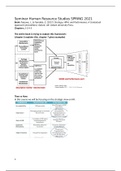Seminar Human Resource Studies SPRING 2021
Book: Paauwe, J., & Farndale, E. (2017). Strategy, HRM, and Performance: A Contextual
Approach (2nd edition). Oxford, UK: Oxford University Press.
Chapters: 2-3-4-5
The entire book is trying to explain this framework:
(chapter 6 explains this, chapter 7 gives examples)
Then vs Now
In this course we will be focusing on the strategic view on HR.
1
,Chapter 2
This chapter will be about strategy. There are different approaches (best practice and best
fit) and different developments regarding strategic management thinking.
What is strategy?
Strategy outlines an organization’s goals, including different performance indicators (market
share, sales, competitive positioning, profit, growth, return on investment) and the means to
achieve those goals (finance, technology, HR).
Especially in large organizations a distinction is made between a
- corporate strategy (= overarching strategy in large organizations)
- business strategy (this one should fit with HR, because it is focused on a specific
market, which requires different goals and resources in order to achieve competitive
positioning. This is more ‘practical’ such as recruitment.)
In this chapter we highlight the concept of (business) strategy and how it is linked to HR.
The most well known and dominant strategic management approach is: the classical
approach = relies heavily on the readiness and capacity of management to adopt profit
maximizing strategies through rational long-term planning.
However, strategy has many guises. Mintzberg (1987) distinguished five meanings of
strategy:
Strategy as a plan (intended)
Strategy as a pattern (realized)
Strategy as a ploy
Strategy as a position
Strategy as a perspective
These different meanings of the concept of strategy are representative of the enormous
variety of approaches and diversity.
The design school sees strategy formation as a deliberate process of conscious
thought, which includes SWOT (strengths, weaknesses, opportunities, threats)
The planning school also sees strategy as a formal process and entails a stepwise
approach to creating an all-encompassing strategy. Is more formalized and detailed
than the design school.
The positioning school perceives strategy mainly from an industrial economics
perspective.
The underlying assumption of these 3 schools is that the environment is more or less stable
and can be studied objectively in order to distil changes and opportunities for strategy.
This kind of approach towards strategy and strategy development has been labelled an
outside-in approach (Porter). The environment, namely the marketplace, is the starting
point for analysis and the subsequent development of appropriate strategic responses in
order to achieve the desired strategic positioning. Porter’s competitive positioning: Cost
leadership, differentiation, focus. But… out of date?
2
,Once you have chosen your strategy, how can you make sure have the right attitude,
mindset and behaviour? And how can we make that happen through HR practices like
recruitment, selection, training, development, leadership style etc. With outcomes such as:
decreased turnover, wellbeing, productivity, commitment etc.
In table 2.4 you can clearly see that there are different roles for different strategies.
3
, The next group of schools are more descriptive in nature.
The entrepreneurial school emphasizes the important role of a visionary leader who
is actively engaged in a search for new opportunities to speed up grow.
The cognitive school considers strategy formulation as a cognitive process that takes
place in the middle of the strategist. Strategies emerge as perspectives that shape
how people deal with inputs from the environment.
The learning school relates back to a stepwise incremental process. Change/direction
are the result of mutual adjustment, internal and external events and decision.
The power school regards the formation of strategy as a bargaining process between
power blocks both inside and between organizations. It emphasizes the use of power
and politics to negotiate strategies that favour particular interests.
The cultural school considers strategy formulation as a process of social interaction,
based on the beliefs and shared understandings of the member of the organization.
This results in a perspective that is reflected in the patterns by which deeply
embedded resources are protected and used for achieving competitive advantage.
The environmental school focuses on the environment as the central actor to the
strategy-making process. It has to respond to forces of the environment, or it will be
selected out.
The configurational school emphasizes that there is no one best way of organizing
and strategy formulation, specific circumstances will make a certain configuration of
context, strategy, structure, process effective.
SCHOOL CHARACTERISTICS KEY PLAYER ENVIRONMENT STRATEGY DOMINANT
OF THE PROCESS DISCIPLINE
DESIGN Conception CEO Opportunities/threats Explicit None
perspective
PLANNING Formal planning Planners Stable and controlled Explicit plan System
theory /
cybernetics
POSITIONING Analysis Analysts Can be analyzed Explicit Economics
generic
position
ENTREPRENEURIAL Vision Leader Can be influenced Implicit None
perspective
COGNITIVE Mental process Mind Hard to understand Mental Psychology
perspective
LEARNING Emergent Everyone Demanding Implicit Psychology
who learns patterns
POWER Negotiation Everyone Can be molded but Positions, Politics
with power difficult ploys
CULTURAL Collective process Collectivistic Incidental Collective Anthropology
perspective
ENVIRONMENTAL Reactive process Environment, Dominant and Specific Biology
stakeholders deterministic position
SO: What do these schools tell us? There is no universally agreed best way of strategy
formulation and subsequent organizing, including with regard to the shaping of HR policies.
4






